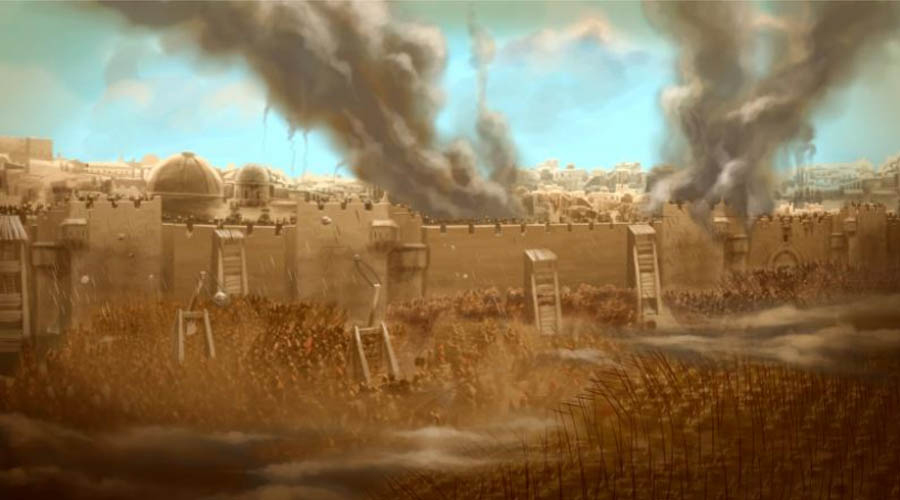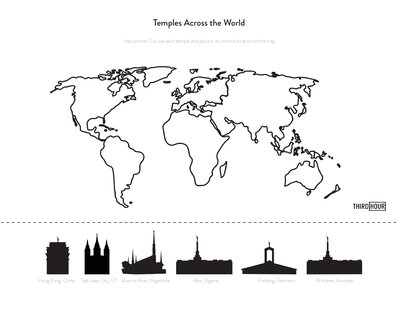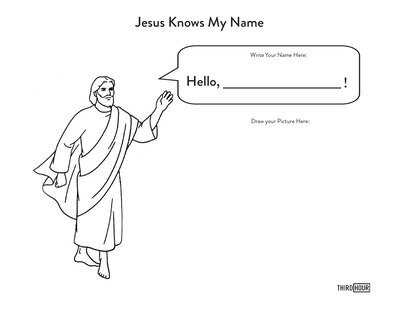“Behold, Thy King Cometh”
See the Easter lesson for a discussion of Christ’s triumphal entry and other events in the final week of Christ’s life.
Children crying in the temple (Matthew 21:15, 16):
Sometimes we glance over short verses in the scriptures and don’t notice how profound they are. Our attention has been captured by Christ’s triumphal entry and how He cleansed the temple. But now on the temple grounds, children are crying out “Hosanna to the Son of David.” The scribes and Pharisees are bothered by this, but Christ rebukes them. It could be interesting in your family or group to discuss this along with the Book of Mormon accounts of little children receiving Christ. What would have happened in Jerusalem if the children had been surrounded by fire, ministered to by angels, and had their tongues loosed as they did in America?
The unrighteous fig tree (Matthew 21:19 – 22; Mark 11:13 – 14, 20 – 24):
The purpose of living things is to “fulfill the measure of their creation.” This fig tree wasn’t doing that, and the fact that Christ chose to smite it may show that it used its agency (all things have agency) in some other way. This is a talk that centers on fulfilling our own measure of creation, which may not be as a shining star. Hugh B. Brown’s story of the Currant Bush teaches a complementary message.
Then the Savior instructs His apostles on the power of the priesthood to command nature. See the following scriptures for examples: Jacob 4:6; Moses 7:13, 14).
The parable of the brothers and the parable of the householder (Matthew 21:23 – 46):
The Savior used these parables to accuse the Pharisees of hypocrisy. The messages were not hidden from them but gave them another excuse to do away with Jesus. They both hated and feared Him.
The parable of the wedding of the king’s son (Matthew 22:1 – 14):
This parable recounts Israel’s dismal history in responding to the invitations of a loving God. The wedding is prepared, including a magnificent feast, but it is rejected, as the king’s favored go about their mundane tasks and focus completely on the things of the world. They slay the king’s servants (the prophets). The king punished those who killed his servants and destroyed their city, but the lesson was never learned.
The king then sent his servants to bring strangers from the broad roads to his feast. These represent the Gentiles. One guest is not wearing a wedding garment and incurs the wrath of the king. Some commentaries say the garment was donated by the king himself, so it was pure rebellion or laziness or disrespect that the guest was there without the proper clothing. Most of the people, then, disrespected the king’s great gifts, essentially trampling them under their feet.
The Lord invites all to come unto Him, but few respond with full intent. Those few who do become His servants are the ones who are chosen. Find a similar story in the parable of the husbandman in Luke 20:9 – 18).
https://www.churchofjesuschrist.org/media-library/video/2010-07-104-many-called-few-chosen?lang=eng
Christ offended the wicked (Matthew 23):
To read Matthew 23 is to see that Christ was not kind to all, not loving to all, but bitterly chastized the hypocrites and the unrepentant. “Woe unto you, scribes and Pharisees, hypocrites! for ye compass sea and land to make one proselyte, and when he is made, ye make him twofold more the child of hell than yourselves” (v. 15). “Ye serpents, ye generation of vipers, how can ye escape the damnation of hell?” (v. 33).
“Your house is left unto you desolate” (Matthew 23:38, 39; Luke 19:41 – 44):
 Christ says the Jews will not see Him again until they say “Blessed is he who cometh in the name of the Lord.” In other scriptures, He says that they will physically gather in the Last Days when they begin to believe in Him.
Christ says the Jews will not see Him again until they say “Blessed is he who cometh in the name of the Lord.” In other scriptures, He says that they will physically gather in the Last Days when they begin to believe in Him.
In 70 A.D. the Romans destroyed Jerusalem and scattered any remaining Jews to the far corners of the earth. This dispersion (“diaspora”) had begun when the northern kingdom of Israel was taken away by the Assyrians, had grown when the Babylonians conquered Judea, and climaxed with the destruction wreaked by the Romans (continuing to the Bar Kochba revolt after the destruction of Jerusalem). Thus, was the house of Israel left desolate.
The story of Zacchæus (Luke 19:1 – 10):
Jesus calls Zacchaeus by name. He was foremost of the tax collectors in Jericho, so Jesus may have heard of him, or Jesus may have known his name because He is God and knows us all. Zacchaeus was hated because he was a tax collector. People assumed that because he was rich he had gotten his gains by serving the Roman oppressors or cheating. But Jesus knew his honest heart. He knows us. This story should encourage us to feel known and loved.
Mary anoints Jesus’ feet (John 12:1 – 8):
Jesus had already raised Lazarus from the dead and He was back in Bethany at the home of Lazarus, Mary, and Martha. Mary anointed Jesus’ feet and Judas Iscariot objected because of the expense of the oils. “Why was not this ointment sold for three hundred pence, and given to the poor?” The next verse is interesting: “This he said, not that he cared for the poor; but because he was a thief, and had the bag, and bare what was put therein.”
Judas may have been carrying the bag that contained the monies for the poor. He wanted the value of the ointment added to it for he intended to steal it. Remember that these scriptures were written long after the death of Christ, written in retrospect with judgment added to the narrative. Was Judas really a thief and an apostle? Or was John looking back and guessing at Judas’ motives because Judas betrayed the Savior?
The chief priests wanted to kill Lazarus (John 12:9 – 11):
This was the week leading to the Passover, and many Jews had arrived in Jerusalem from faraway places. When they heard the story of Lazarus having been raised from the dead and hearing that Jesus was in Bethany, many decided to make the very short journey to see. The high priests considered killing Lazarus for this reason. Many began to believe in Christ because of this miracle.
Jesus predicts His death and there is a voice from heaven (John 12:23 – 36):
In these verses you can sense Christ’s trepidation at what is coming — “Now is my soul troubled; and what shall I say? Father, save me from this hour: but for this cause came I unto this hour” (v. 27).
The people heard the voice of the Father glorifying His Son:
“Father, glorify thy name. Then came there a voice from heaven, saying, I have both glorified it, and will glorify it again. The people therefore, that stood by, and heard it, said that it thundered: others said, An angel spake to him. Jesus answered and said, This voice came not because of me, but for your sakes.” (vs. 28 – 30).
Some of the chief rulers believe in Christ (John 12:42 – 43):
“Nevertheless among the chief rulers also many believed on him; but because of the Pharisees they did not confess him, lest they should be put out of the synagogue: For they loved the praise of men more than the praise of God.”
Being put out of the synagogue means being excommunicated.
Lesson Resources:
churchofjesuschrist.org — Come Follow Me



